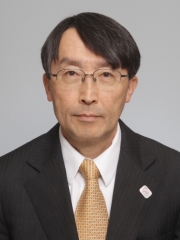Message from the Dean

Science is the study of unraveling the structures and mechanisms of the natural world. At its root, it requires a genuine curiosity and spirit of inquiry, and an attitude of seeking to elucidate unknown phenomena. However, the study of science is not limited to the mere accumulation of knowledge; one of its important purposes is to apply it and contribute to humanity and society. Students are required to link the study of science to society and to have a viewpoint that contributes to a sustainable future. In other words, the significance of studying science is to both “search for truth” and “contribute to society”.
To gain a deep understanding of science, it is essential to have a solid foundation in mathematics, physics, chemistry, biology, geology and other basic knowledge and methodologies. Each field has theories and experimental methods that have been cultivated over many years, and studying them systematically fosters the ability to think scientifically and solve problems. It is important to keep in mind that students should not simply memorize knowledge, but rather ask questions, think in their own way, and verify their findings.
The Faculty of Science at Niigata University has established an educational system that aims to foster human resources in basic science with a proactive and creative attitude toward inquiry through systematic study of the common basic subjects in natural science, common basic subjects, common core subjects, and specialized subjects in each program. Through lectures, practical training/experiments and fieldwork, students are encouraged to formulate hypotheses based on data, verify them, and cultivate an attitude of discovering new knowledge.
On the other hand, today's issues are complex and often cannot be solved by knowledge in one field alone. For example, issues such as climate change, environmental problems, and disaster recovery can only be deeply understood and solutions found by combining knowledge from multiple fields. In other words, students are required to link their science studies to society from an interdisciplinary perspective and to have a viewpoint that contributes to a sustainable future.
Under the Department of Science, Niigata University Faculty of Science has seven degree programs in Mathematics, Physics, Chemistry, Biology, Geology, Environmental science, and Field Research in the Environmental Science, and boasts the largest number of faculty members and student capacity on the Sea of Japan coast. In collaboration with the Faculty of Agriculture, the Sado Island Center for Ecological Sustainability, and the Research Institute for Natural Hazards and Disaster Recovery, we are actively and cross-disciplinary in our efforts to address the complex issues of our time.
Many of our graduates go on to graduate school and subsequently work extensively as engineers in science and engineering companies, science and mathematics teachers in junior high and high schools, and researchers and teachers in universities and research institutes. The studies in the Faculty of Science and the Graduate School of Science and Technology provide students with the knowledge and broad applied skills that form the foundation of all sciences. In addition, we place a strong emphasis on career education, where students learn how their expertise in science can be applied in society through a wealth of real-life examples.
We hope that all of you who are interested in science will find a career path that suits you among the many and varied attractions of the Faculty of Science at Niigata University, and study with us to further improve your skills.
Eiichi Takazawa
Dean
